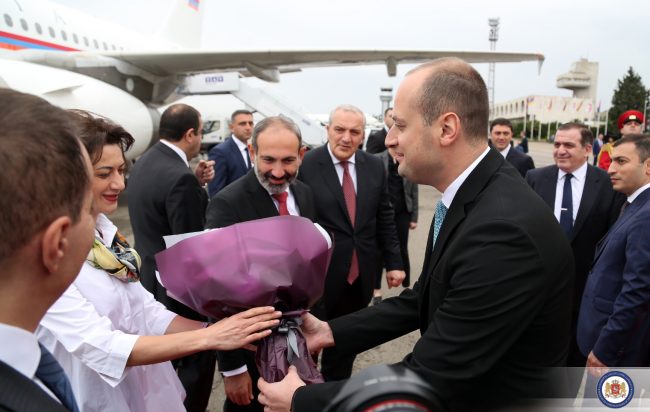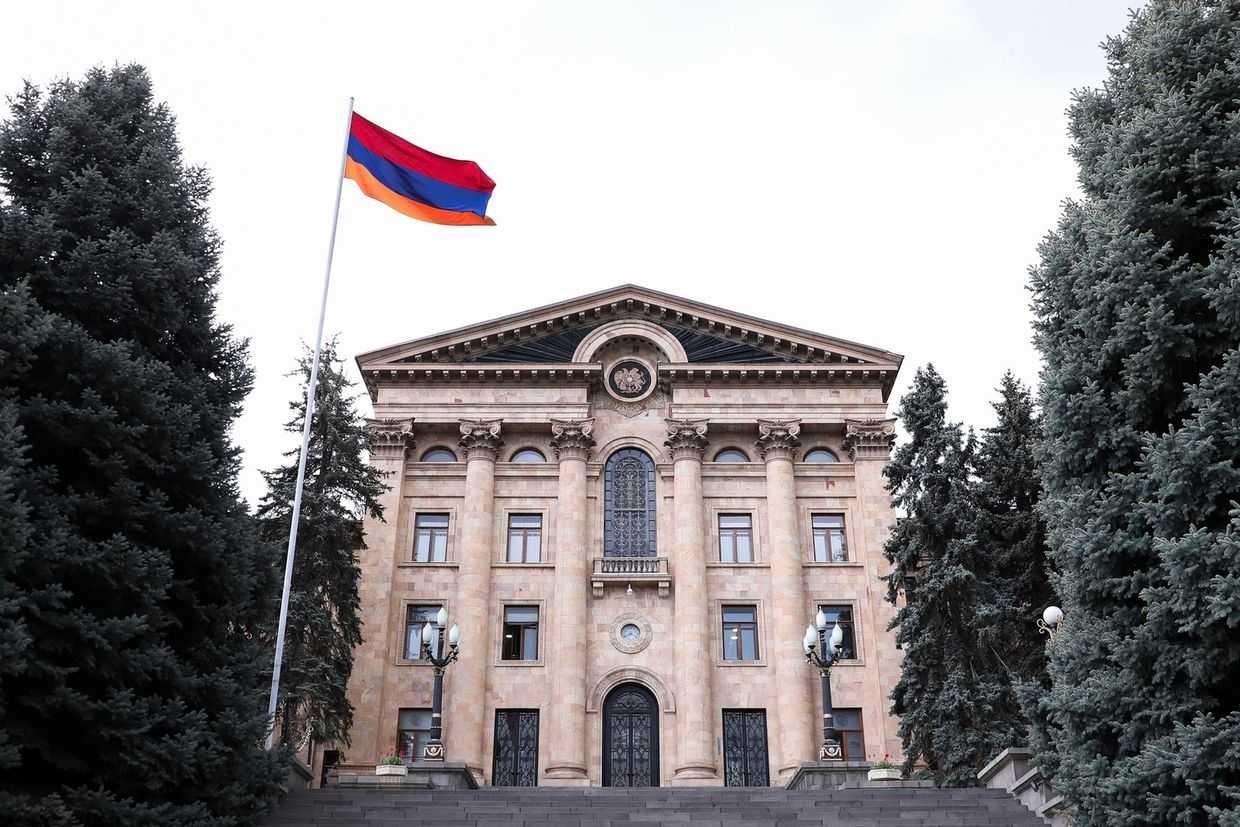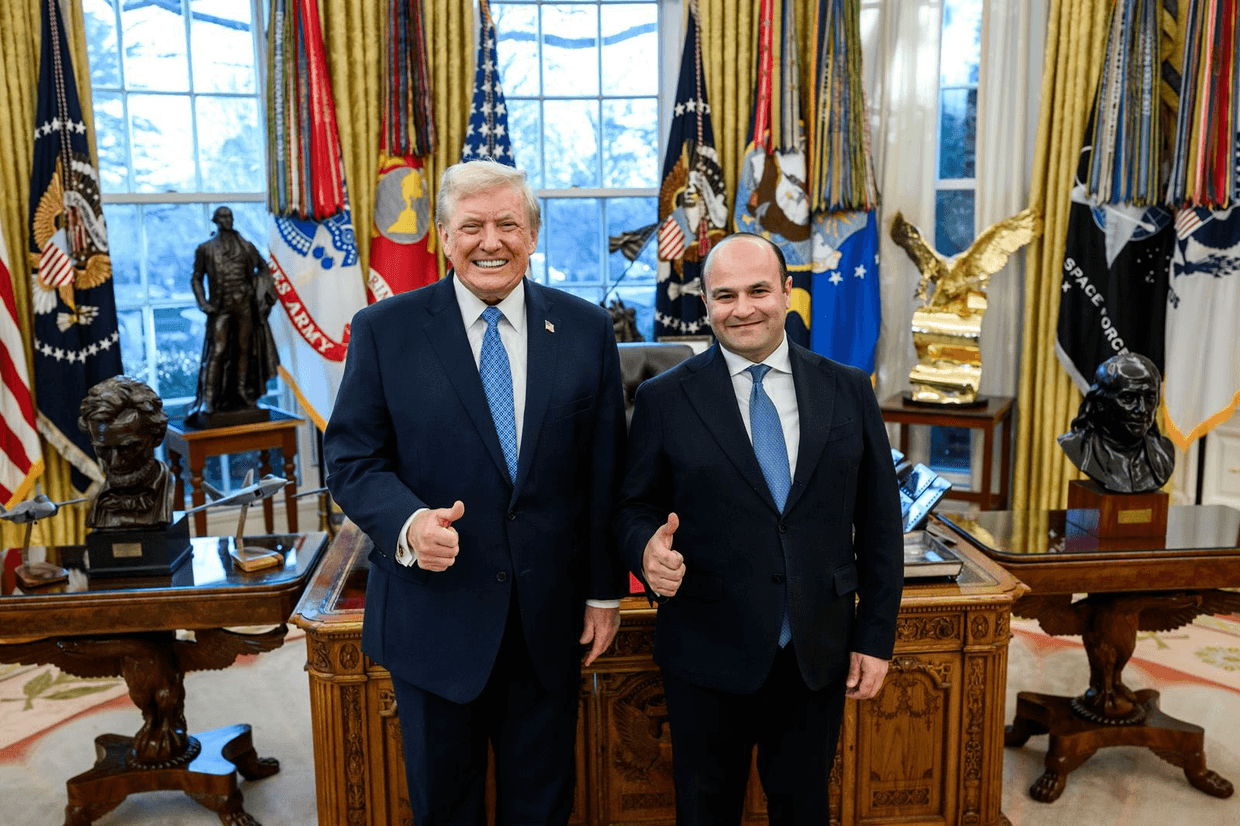

 Armenia’s new Prime Minister Nikol Pashinyan is on his first official visit to Georgia, accompanied by his wife Anna Hakobyan and several ministers.
Armenia’s new Prime Minister Nikol Pashinyan is on his first official visit to Georgia, accompanied by his wife Anna Hakobyan and several ministers.
The Armenian delegation was greeted in Tbilisi by Georgian Foreign Minister Mikheil Janelidze, as well as by representatives of the Armenian Apostolic Church in Georgia.
Janelidze said that the visit was an opportunity to discuss ‘issues concerning trade and economic relationships, cultural ties, and common political dialogue’, and expressed a hope it would result in ‘new results’ in bilateral relations.
Pashinyan held meetings with Georgian counterpart Giorgi Kvirikashvili, Parliamentary Speaker Giorgi Kobakhidze, and President Giorgi Margvelashvili.
After tête-à-tête meeting with Kvirikashvili, another meeting in a wider format was held with cabinet ministers from both countries.
Referring to Pashinyan’s dramatic rise to power in what has been dubbed a ‘Velvet Revolution’, Kvirikashvili said at a joint press conference that the ‘stability and development of Armenia is very important, therefore we followed the latest events [in Armenia] closely. The Armenian people revealed an adherence to unity and democratic principles, which resulted in a peaceful change of power’.
‘We declared independence and [created] our first republics at the same time’, remarked Kvirikashvili at the briefing.
Armenia, like Azerbaijan, marked the 100th anniversary of the foundation of their first republics on 28 May. Georgia exited the Transcaucasian Federation and declared independence on 26 May 1918, with Armenia and Azerbaijan following suit declaring independent Armenian and Azerbaijani states at the then-Viceroy Palace in central Tbilisi.
‘It is not a coincidence that my first official visit is to Georgia; this reflects my people’s as well as my personal attitude towards Georgian people and Georgia’, said Pashinyan, who returned to Kvirikashvili congratulations on the occasion of independence day.
Pashinyan vowed his new government would do everything possible to deepen Armenian-Georgian relations. ‘We wanted to see Georgia strong and sustainable’, the Armenian Prime Minister stated, adding that “there is no issue in Armenian-Georgian relations that cannot be solved’.
Pashinyan also talked of the ‘special interest’ in Georgian society and media towards the ‘velvet revolution in April–May’, and expressed his hopes that mutual interests would go beyond ‘big political’ events and that the media in Armenia would help Armenians and Georgians be better informed about ‘important developments’ in the neighbouring countries.
‘Ethnic Armenian citizens of Georgia actively participate in state-building, which is a testimony to the unity of multinational Georgia’, said Kvirikashvili at the joint press briefing while announcing Pashinyan’s planned visit to Samtskhe-Javakheti the following day.
Pashinyan will be accompanied by Georgian Foreign Minister Janelidze in meeting representatives of the local ethnic-Armenian minorities in Javakheti, as well as visiting the Hovhannes Tumanyan House Scientific-Cultural Centre. According to the official agenda, Pashinyan will return to Armenia by car.
A ‘Velvet Revolution’
Pashinian was appointed prime minister on 8 May following mass protests dubbed ‘No to Serzh’ against the appointment of former president Serzh Sargsyan as prime minister. Sargsyan resigned on 23 April.
Fiery revolutionary or pragmatic politician: what to expect from Nikol Pashinyan
Pashinyan is the second high-ranking official visiting Georgia within a week, after Armenian President Armen Sarkissian’s trip to Georgia on 25–26 May, coinciding with the centennial celebration of the first Democratic Republic of Georgia. Sarkissian was hosted by President Margvelashvili and Prime-Minister Kvirikashvili. On 26 May, the newly elected President of Armenia also met former Prime Minister of Georgia, current head of the ruling Georgian Dream Party Bidzina Ivanishvili.
The Armenian delegation’s visit to Georgia also follows the revitalisation of the 2011 Georgia-Russia agreement on ‘the basic principles for a mechanism of customs administration and monitoring of trade in goods’, discussed within the Karasin-Abashidze format of Georgian-Russian dialogue on 24 May.
Implementation of the agreement includes the creation of a Swiss-monitored ‘corridor’ from Gori to North Ossetia via the Roki tunnel, passing through South Ossetia, and potentially opening another route for trade between Armenia and their main strategic partner — Russia. In December 2017, Kvirikashvili assured Georgia’s opposition that the corridor would only be used when weather conditions closed the existing Kazbegi-Zemo Larsi pass. The initiative has been criticised by a number of politicians in Azerbaijan.
[Read more about the Georgian-Russian negotiations on OC Media: Russia–Georgia trade corridor agreement ‘to move forward’]









